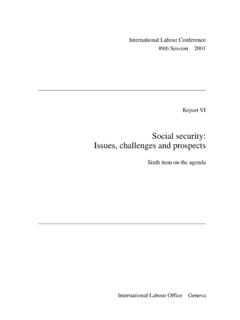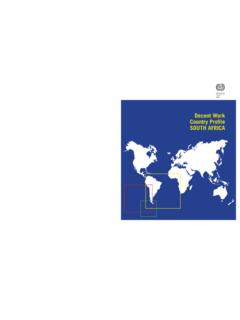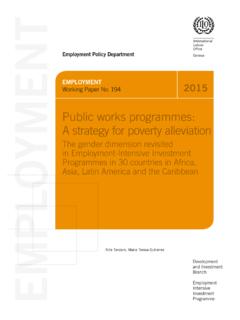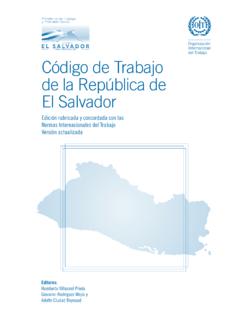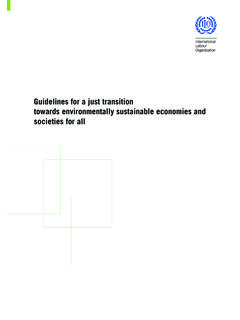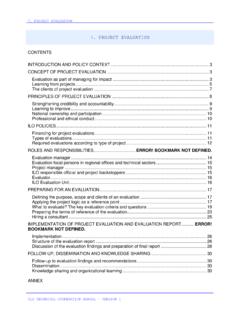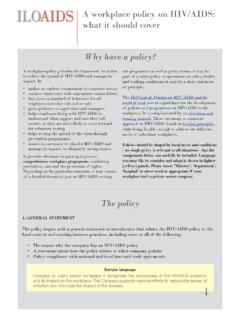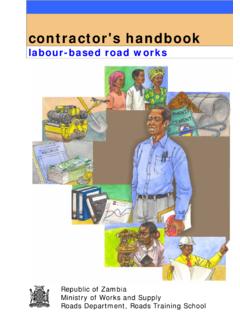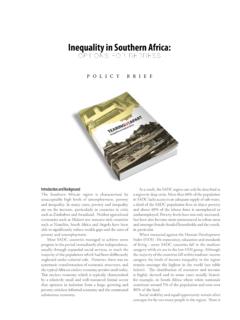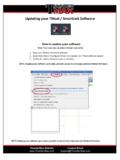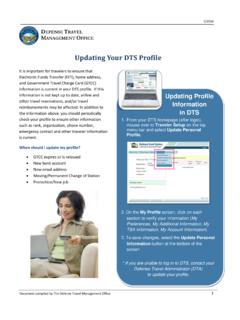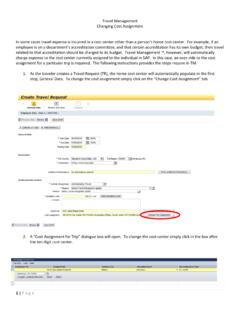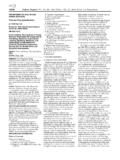Transcription of Resolution Concerning Updating ISCO
1 Resolution Concerning Updating ISCO 1 Resolution Concerning Updating the International Standard Classification of Occupations The Tripartite Meeting of Experts on Labour Statistics on Updating the International Standard Classification of Occupations (ISCO), Having been convened at Geneva by the Governing Body of the ILO and having met from 3 to 6 December 2007; Recalling the Resolution of the Fourteenth International Conference of Labour Statisticians, made on 6 November 1987, endorsing the International Standard Classification of Occupations, 1988 (ISCO-88); Recalling the request made by the Statistical Commission of the United Nations at its 34th session (March 2003) that the timetable for the revision of ISCO should meet the needs of the 2010 round of population and housing censuses.
2 And Concurring that, whilst the basic principles and main structure of ISCO-88 remain valid, significant modifications reflecting experience gained in many countries using ISCO-88-based classifications and new developments in the world of work, are necessary to allow ISCO to continue to be a useful model for the development of national classifications and a basis for international comparison and exchange of information classified by occupation; Recalling the recommendation adopted by the Seventeenth International Conference of Labour Statisticians in 2003 for the meeting to evaluate the work of the ILO to update ISCO-88 and to make appropriate recommendations on the results to the Governing Body; and Having examined the report to the Meeting describing the work of the International Labour Office on Updating ISCO-88; Adopts, this sixth day of December 2007, the following Resolution 1.
3 The occupational classification system of major, sub-major, minor and unit groups shown in the Annex to this Resolution is endorsed by the Meeting of Experts in Labour Statistics and is designated the International Standard Classification of Occupations, 2008 (ISCO-08). 2. ISCO classifies jobs. A Job is defined for the purposes of ISCO-08 as a set of tasks and duties performed, or meant to be performed, by one person, including for an employer or in self employment.
4 3. An occupation is defined as a set of jobs whose main tasks and duties are characterised by a high degree of similarity. A person may be associated with an occupation through the main job currently held, a second job or a job previously held. 4. Jobs are classified by occupation with respect to the type of work performed, or to be performed. The basic criteria used to define the system of major, sub-major, minor and unit groups are the skill level and skill specialization required to competently perform the tasks and duties of the occupations.
5 2 Resolution Concerning Updating ISCO 5. In collecting and processing statistics classified by occupation ( for use in fields such as labour market analysis, educational planning, human resource planning, occupational health and safety analysis, wages analysis, etc.), each country should endeavour to compile data that can be converted to the ISCO-08 system, to facilitate the international use and comparison of occupational information. 6. Countries should provide information to the ILO about how the groups defined in the classification (or classifications) of occupations used for national purposes can best be related to ISCO-08.
6 7. The Meeting of Experts notes that the ILO plans to: (a) publish ISCO-08 including definitions of the major, sub-major, minor and unit groups and an index of occupations in English, French and Spanish; (b) provide a manual and training material on how to adapt ISCO-08 for use in national and regional settings; and provide training on a regional basis through a series of regional workshops; (c) ensure that, as the custodian of the International Standard Classification of Occupations (ISCO-08), it will have the capacity to provide the technical advisory services that will be needed particularly by the developing countries to ensure that national occupational classifications can be developed or improved correspondingly and be used effectively and reliably.
7 Resolution Concerning Updating ISCO 3 Annex to the Resolution : ISCO-08 Structure, Group Titles and Codes Major Groups 1 Managers 2 Professionals 3 Technicians and associate professionals 4 Clerical support workers 5 Service and sales workers 6 Skilled agricultural, forestry and fishery workers 7 Craft and related trades workers 8 Plant and machine operators, and assemblers 9 Elementary occupations 0 Armed forces occupations 4 Resolution Concerning Updating ISCO Major groups and sub-major groups 1 Managers 11 Chief executives.
8 Senior officials and legislators 12 Administrative and commercial managers 13 Production and specialized services managers 14 Hospitality, retail and other services managers 2 Professionals 21 Science and engineering professionals 22 Health professionals 23 Teaching professionals 24 Business and administration professionals 25 Information and communications technology professionals 26 Legal, social and cultural professionals 3 Technicians and associate professionals 31 Science and engineering associate professionals 32 Health associate professionals 33 Business and administration associate professionals 34 Legal, social.
9 Cultural and related associate professionals 35 Information and communications technicians 4 Clerical support workers 41 General and keyboard clerks 42 Customer services clerks 43 Numerical and material recording clerks 44 Other clerical support workers 5 Service and sales workers 51 Personal service workers 52 Sales workers 53 Personal care workers Resolution Concerning Updating ISCO 5 54 Protective services workers 6 Skilled agricultural, forestry and fishery workers 61 Market-oriented skilled agricultural workers 62 Market-oriented skilled forestry, fishing and hunting workers 63 Subsistence farmers, fishers, hunters and gatherers 7 Craft and related trades workers 71 Building and related trades workers, excluding electricians 72 Metal, machinery and related trades workers 73 Handicraft and printing workers 74 Electrical and electronic trades workers 75 Food processing, wood working.
10 Garment and other craft and related trades workers 8 Plant and machine operators, and assemblers 81 Stationary plant and machine operators 82 Assemblers 83 Drivers and mobile plant operators 9 Elementary occupations 91 Cleaners and helpers 92 Agricultural, forestry and fishery labourers 93 Labourers in mining, construction, manufacturing and transport 94 Food preparation assistants 95 Street and related sales and service workers 96 Refuse workers and other elementary workers 0 Armed forces occupations 01 Commissioned armed forces officers 02 Non-commissioned armed forces officers 03 Armed forces occupations, other ranks 6 Resolution Concerning Updating ISCO Major groups, sub-major groups and minor groups 1 Managers 11 Chi
